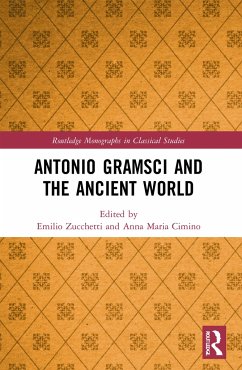
Gramsci and South Asia
Common Sense, Religion and Political Society
Versandkostenfrei!
Versandfertig in 6-10 Tagen
154,99 €
inkl. MwSt.
Weitere Ausgaben:

PAYBACK Punkte
77 °P sammeln!
Gramsci's theory of common sense is a metanarrative that can be used to explain both religion and political formations. This book examines Gramsci's perspective and how his theories translate into South Asian society. It explores Gramsci's historicism, which is sensitive to historical, regional and national differences, and its relevance in post-colonial societies.The volume discusses themes like common sense, religious common sense, folk religion, dialogue and common sense concerning civil/political society through the lens of Gramsci's historical perspectives. It also looks at Gramscian crit...
Gramsci's theory of common sense is a metanarrative that can be used to explain both religion and political formations. This book examines Gramsci's perspective and how his theories translate into South Asian society. It explores Gramsci's historicism, which is sensitive to historical, regional and national differences, and its relevance in post-colonial societies.
The volume discusses themes like common sense, religious common sense, folk religion, dialogue and common sense concerning civil/political society through the lens of Gramsci's historical perspectives. It also looks at Gramscian critique of political secularism, the ideology and politics of Hindutva, civil society in a non-Western context and modes of political society in India.
Lucid and topical, this book is a must-read for scholars and researchers of political studies, political philosophy, post-colonial studies, South Asian politics, cultural studies and political sociology.
The volume discusses themes like common sense, religious common sense, folk religion, dialogue and common sense concerning civil/political society through the lens of Gramsci's historical perspectives. It also looks at Gramscian critique of political secularism, the ideology and politics of Hindutva, civil society in a non-Western context and modes of political society in India.
Lucid and topical, this book is a must-read for scholars and researchers of political studies, political philosophy, post-colonial studies, South Asian politics, cultural studies and political sociology.














